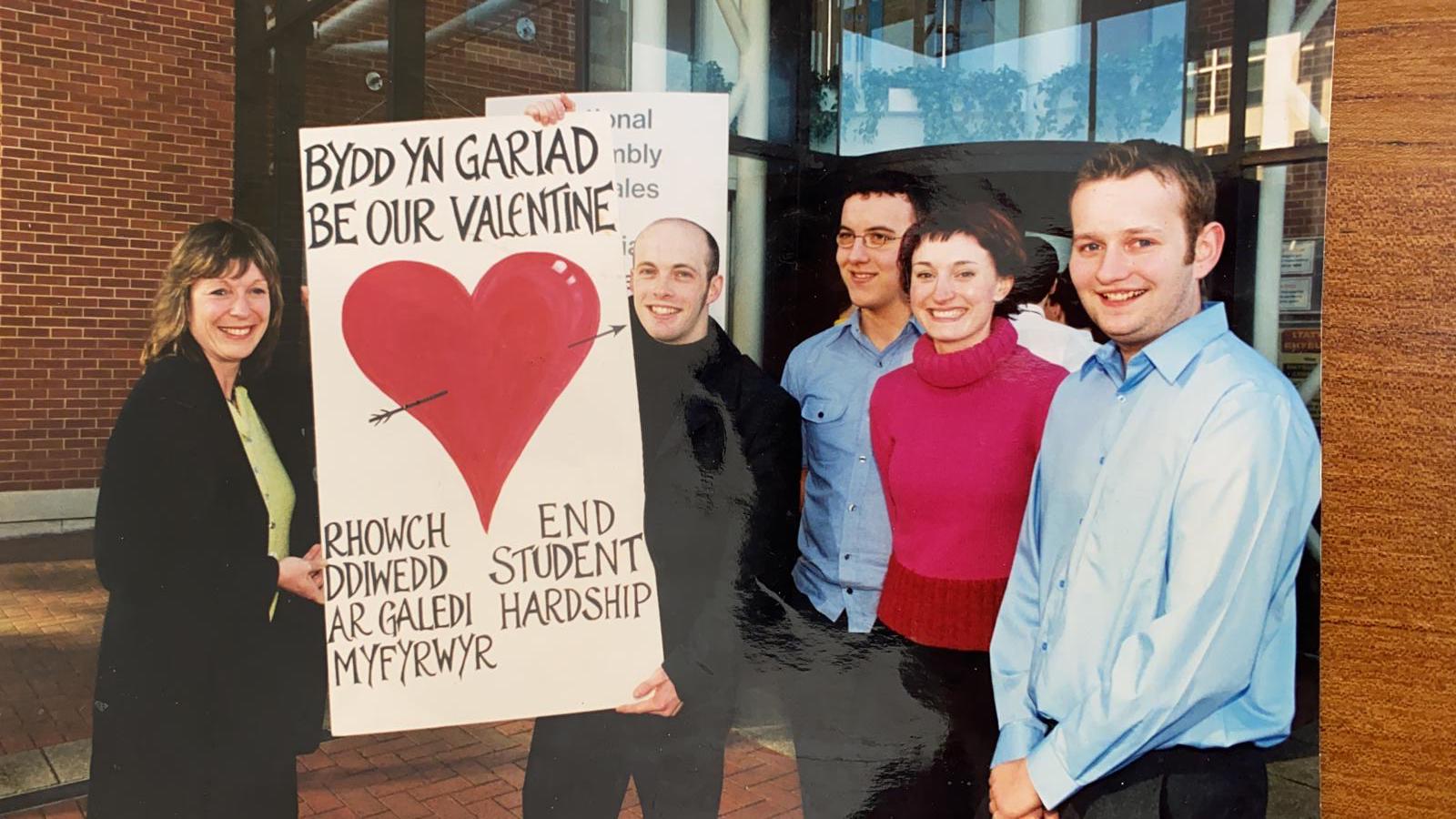Rae Tooth: The charity boss fighting for social justice

By the age of 11, Rae Tooth already had some big wins on injustice under her belt.
When the boys refused to let the girls play football in the playground, Tooth organised a sit-down protest at lunchtime. The girls triumphed after occupying the football pitch for three days.
And when the girls were separated from the boys to learn about periods, Tooth went to speak to the headmaster and argued for the boys to be in on those talks, too. Shortly after, school policy was changed, and all children learned about periods together.

“I think I would describe myself as having always been a campaigner. I don’t think I ever didn’t want to do something around social justice,” she says.
The importance of social mobility
“My dad’s parents came from what I would describe as extreme poverty. My papa got a job as a caretaker in a school and he became the shop floor steward of his union: they were very driven by the importance of social mobility and equality. And so, somehow, even though it wasn’t talked about at home, I think it just landed in me.”
Now, three decades on from her school days, Tooth spends her days fighting for social justice as the chief executive of the Villiers Park Education Trust, a charity that offers programmes for disadvantaged students.
More: ‘Community of practice’ to showcase FE research
Background: Drop-in students taking HE courses in colleges
News: Mental health conditions triple for Neet young people
Tooth was born in Harrow, north-west London, and her family moved to Cambridge when she was a baby. Her parents had varied careers: her father worked as a technician in a research lab, but also as a plumber; her mother worked in pubs and supermarkets, while looking after Tooth and her younger brother. “My brother describes our home as we don’t come from a broken home, we came from a breaking home,” she says.
Although Tooth loved school, she says she struggled to learn and was in the lowest sets for everything. Throughout her education, she was told countless times that she wasn’t clever enough to be a secretary, but as she was friendly and caring, she could make a good nursery nurse.
When completing her A levels, Tooth was diagnosed with dyslexia.
“[The diagnosis] felt really mixed. So partly there was this feeling of, ‘It’s not my imagination, there’s something wrong,’ so it felt really validating, and it was great. But then [there was] also a real sense of grief. I realised it wasn’t going to get easier, and it’s not just that I needed to try harder,” she says.
With the diagnosis came proper support - and Tooth went on to get the second highest mark in her year in her English A level. “That’s the difference that support, a diagnosis and a belief in someone’s ability can make,” she says.

The world had suddenly opened up to her, and Tooth took a year out after leaving school to consider her future. She got a job working at Motorcycle News, and decided to study journalism at Cardiff University the following year. At Cardiff, she discovered the importance of storytelling and narrative when it came to tackling social injustice,
“In Cardiff, it was mostly full of affluent students, and, through no fault of their own, they genuinely have no comprehension about what it is like to come from a disadvantaged background, what it’s like to be hungry sometimes or to be cold,” Tooth says. “And unless you can tell stories, unless you can illustrate it in a way which is meaningful, then it’s just impossible to grasp, because it’s so completely outside of their experience.”
Fighting for fairness
When Tooth graduated from university, she went on to be the women’s officer for the NUS students’ union, and campaigned on gender equality and sexual health - during that time, she set up the UK’s largest condom consortium. “It’s still running today and I am very proud of it,” she laughs.
The strong sense of fighting for fairness has been at the heart of Tooth’s career. From the NUS she moved to the Equal Opportunities Commission, working as a legal adviser for women who had faced sexual discrimination at work. But the work, she says, was exhausting.
“After 18 months, I just thought, ‘I can’t hear more of this.’ Talking to people in crisis is really hard. All we were doing was looking for some kind of restoration because something’s already gone wrong. We weren’t addressing what the problems were - it was too late,” she says.
Tooth was keen to move into more preventative work - and her time at the EOC had taught her about the major role that education played in workplace discrimination.
“The women who were getting shafted by their employers the most were always uneducated. If you’re in a low-paid job, if you had low levels of education, it just was so painfully obvious those people were not able to negotiate systems and processes, and which means they’re vulnerable,” she says.
Roles at the Higher Funding Council, the Office for Fair Access and the Office for Students followed, and Tooth led nationally on major strategies that sought to improve access to higher education for disadvantaged groups. And while big data played a big part in those strategies, Tooth pushed hard on the importance of narrative.
“When we consistently say that we need to see big data to understand whether something is wrong or not, then we devalue the voice and individual experience, and they are experts,” she says.
“There is something around bringing together data and lived experience to help to really understand what those stories are. So you can use data to see where there is discrimination or where there are unequal outcomes, and then the understanding the why and the how they really manifest themselves.
“When you look at recruitment of black and minority ethnic students to university, and when you talk to students, they say things like, ‘They had a hairdresser on the high street who can cut Afro hair,’ or, ‘There’s an Asian beautician who knows how to do my eyebrows,’ and, ‘When I go to the chemist, I can get foundation which matches my skin colour.’ And a university is never going to guess that’s the thing which makes a difference.”
Villiers Park: Supporting disadvantaged children
Tooth did a lot of work in setting up the Office for Students, but quickly realised that its prescriptive approach wasn’t for her - and so started looking for other opportunities. When the role at Villiers Park came up, it took her back 20 years.
As a teenager, Tooth actually participated in a Villiers Park programme herself around English language. She said it was the first time in her life when she realised that she was worth investing in - and it was worth investing in herself. And so, reflecting on the experience, and knowing how crucial it is to ensure that all students come to the same conclusion, Tooth went for the job.
She’s now been at the charity for 18 months, and has already transformed much in a short amount of time. A lot of the work in the past had focused on the “gifted and talented” students, which meant only reaching the top 20 per cent of the disadvantaged high achievers. Today, the charity’s new programme “Future Leaders“ sets out to reach 100 per cent of disadvantaged high achievers and coaches them towards achieving their goals.
Tooth has also moved the charity from being inward-facing to outwardly engaging in the public discourse around the issues that affect their learners the most.
“There were just so many things which needed to change. We didn’t really have a voice or presence anywhere. It seemed to me, if you are working with a group of people and becoming experts in their experiences, which we are, then part of what you need to be doing is amplifying those voices through advocacy work,” she says.
“It’s bringing in the narrative again, and making sure we are getting those voices and those experiences into policy development, and making sure that people understand where the actual obstacles are, not where the obstacles are which people have invented in their head.”
Tooth’s vision for what the charity could offer disadvantaged young people goes way beyond the learners themselves. The charity has recently launched a ”Community of Practice” in which further education practitioners can share, discuss and develop research into social justice issues. There will also be a specific CPD programme for FE practitioners and HE academics in which they will be paired up to develop research on the barriers that disadvantaged young people face, and how to tackle them.
Balancing work and home life
As well as her work at Villiers Park, Tooth is also a governor for Winchester University as well as doing advisory work for other charities, and coaching practice. Her work life is busy - and her home life more than matches it.
Tooth is a single mum to her 12-year-old daughter and nine-year-old son, and says home-schooling while running the charity has been challenging. But having access to influential figures at work does have its benefits for her children, too.
“My son sat on my lap and interviewed members of the Education Select Committee panel before the hearing started. I had a meeting with a member of the House of Lords and he came and quizzed them about how you get to be in the House of Lords and ‘what happens if you’re a lord and you’re racist, can we get rid of you?’ He asked the tough questions,” she laughs.
“We’re privileged now, I can’t pretend we’re not - there is no doubt about it. And they both have access to those kinds of opportunities, which are absolutely fantastic. And that’s because of the job I do.”
You need a Tes subscription to read this article
Subscribe now to read this article and get other subscriber-only content:
- Unlimited access to all Tes magazine content
- Exclusive subscriber-only stories
- Award-winning email newsletters
Already a subscriber? Log in
You need a subscription to read this article
Subscribe now to read this article and get other subscriber-only content, including:
- Unlimited access to all Tes magazine content
- Exclusive subscriber-only stories
- Award-winning email newsletters